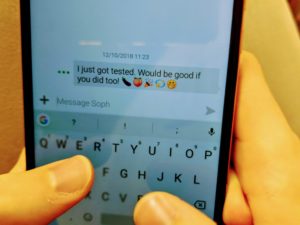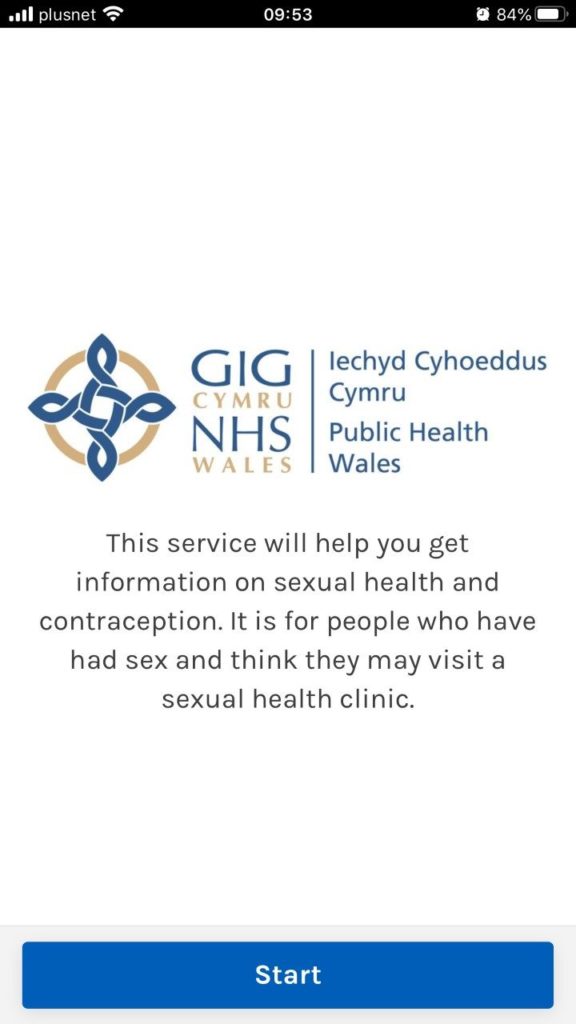

Public Health Wales – Service Design for Sexual Health
We worked with Public Health Wales and young people to develop a better digital sexual health service that changed what could be a 2 hour wait for triage into 40 seconds. The project was funded by YLab, Cardiff University and Welsh Government’s Innovate to Save programme.
Sexual health is a topic that young people can find difficult to talk about. It’s something so personal, that many people turn to Google rather than a medical professional when they need to seek advice. Public Health Wales and ProMo Cymru wanted to make sure that the online information that young people in Wales were finding when they searched was useful and relevant.
Our project found strong indicators that available online NHS sexual health information and other online information is not in a format that young people can easily understand and act on. This may result in additional demand on the NHS and young people not being seen at the right time for treatment. Worryingly, of the 35 young people, we worked with not one could correctly act on the sexual health information they found online. This resulted in young people telling us that they would visit a sexual health clinic the next day if they had a concern.
We spoke to a sexual health clinic and saw that the demands on the service caused by a lack of information resulted in young people presenting to the clinic for some STIs such as Gonnorhea and Chlamydia before these could be detected. This resulted in young people having to attend for a second time at the clinic and the possibility that those who needed to be seen immediately were not being seen due to the length of the queue at the clinic.
Creating a prototype
Initially, we had not understood the apparent scale of the problem and had thought some young people would have been able to correctly act on the information they found online. From our work with different groups of young people, it became clear that inaccessible information was a problem for all. The scale of this finding caused ProMo to change the course of our work to try and address the systemic issues in health information. We did this by creating a prototype digital sexual health tool. This tool was designed to support young people to more easily process and act on sexual health information.
The prototype digital tool asked young people short simple questions and then returned a personalised response based on their answers. We achieved this through using a process of Service Design, continuously developing the prototype through feedback and testing with young people. A wide range of young people were consulted, including some visually impaired, those at risk of becoming NEET (Not in Education, Employment or Training) and the Cardiff Deaf Youth Club. We could show that the prototype made it easier for young people to process and act on sexual health information.

“This is really good. It is like a Buzzfeed Quiz. The Buzzfeed quiz of sexual health.” – Young person
Our Findings
- 46% of the young people found and acted correctly on the information in our sexual health tool (0% with the existing service).
- 100% of professionals who tested the tool agreed that it was better than existing digital sexual health information.
- 100% of young people we spoke to felt that the tool developed was more effective and useful than existing services
There was a preference for video content overall. It allowed young people to ‘rehearse’ attendance at a clinic, or listen to real stories from those with similar experiences.
“It would be really important to know what to expect when you actually go to the clinic.” – Young person
We found that the prototype tool didn’t work as well with deaf young people, identifying that this group needs to be supported with further sexual health education.
Keep it simple
We did our best to hide complicated pathways from young people using the service. The image below shows a small section of the possible routes that our prototype helps young people navigate.

We asked simple questions and used clear statements to help young people access the health information they needed to make an informed choice.
What we learned
ProMo Cymru developed a new model for considering whether communication information is useful:
- Is the information accessible and easy to understand?
- Is it visible and easy to find?
- Does the information allow users to process and act upon the intended message?

What’s next?
ProMo and Public Health Wales will be working on developing our findings into actions to better support people.
Our Thanks
ProMo is grateful to have worked with Public Health Wales and Y Lab. Thanks to the amazing young people who tested and helped us develop the tool. A special thank you to Ucan, Cardiff Deaf Cool Youth Club, Stanwell Sixth Formers and Cardiff and Vale College. The learning from this project will influence how we provide information to young people in Wales.
ProMo Cymru delivers a wide variety of work, visit our What We Do section to see a list of the services we provide and take a look at our Projects page to read up about some of our previous work.
